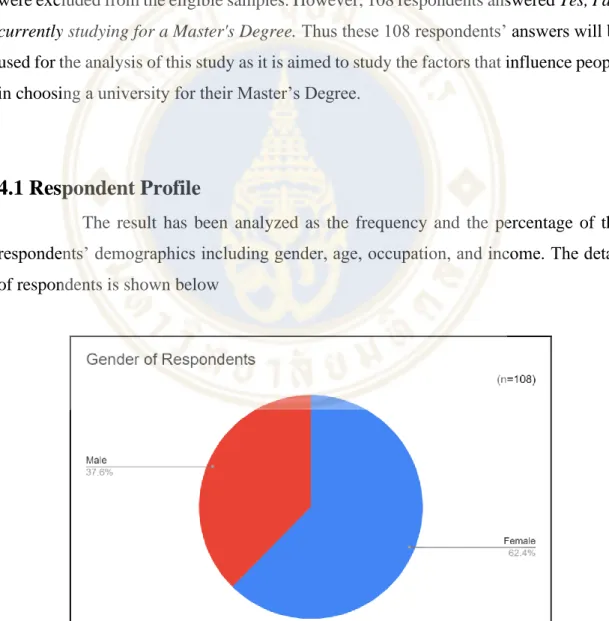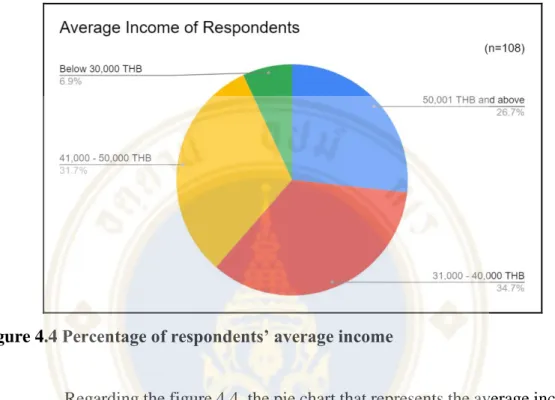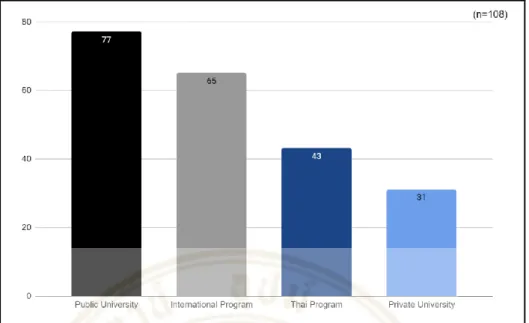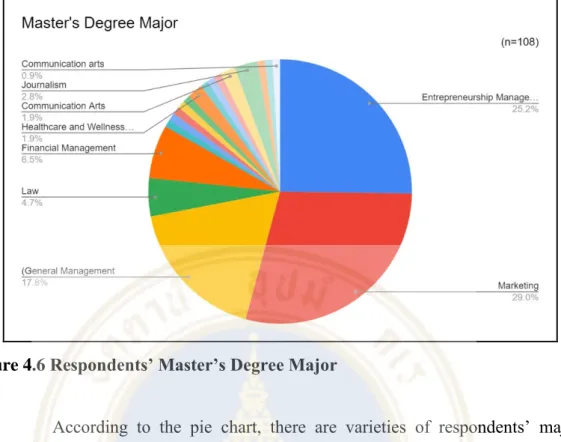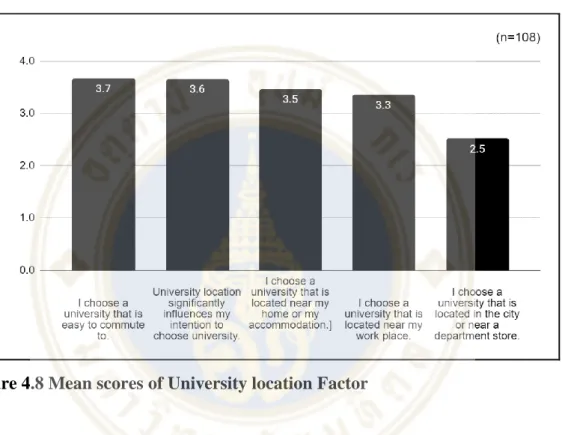The aim of this thematic paper is to identify the key factors that influence candidates to choose a university for postgraduate studies. The research method that has been used for this thematic paper is a quantitative method by sending an online survey with the expectation of at least 100 responses from respondents who are currently studying graduate courses. The result of this thematic paper indicated that with all the factors, the most influential factors that they perceived as important for choosing a university are the university curricula, university reputation, university location and tuition fees.
Thus, understanding the key factors would help universities to effectively consider whether there should be any changes or adjustments to meet the needs and interests of students when looking for a university for a master's degree. When it comes to reasons, there are many factors that influence people to choose to pursue their higher level of education and one of them is their future career. Getting students to choose one university for their business education requires a strategy.
Although there is a lot of research on factors that motivate students to choose a university for their studies, researchers still want to study more on this topic. The research will help identify the main influential factors that motivate candidates to choose universities for vocational education.
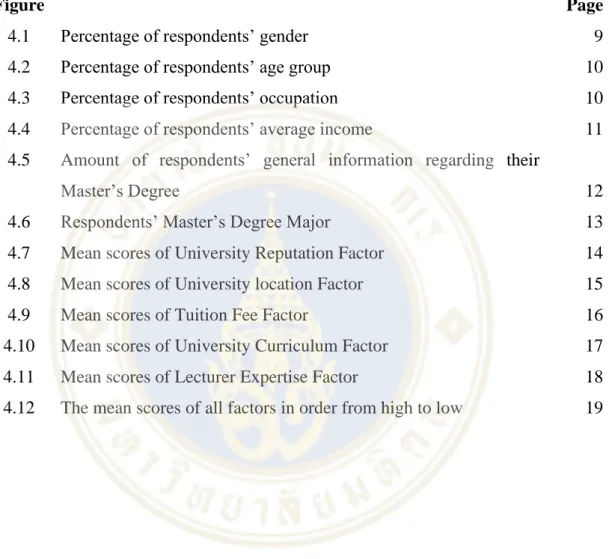
LITERATURE REVIEW
- University Reputation
- Location
- Tuition Fees
- University Curriculum
- Lecturer Expertise
If the university is not so far away from the student's home, the transport costs are not high and they can save more time, which is important and also linked to individual satisfaction. For example, in Canada, if students have to pay 100% of tuition fees, they disagree with the idea and also argue that this increasing tuition fee will lead to losses in the university (Danilo et al., 2019). With this, it seems that tuition fees are one of the factors that influence the student's intention to choose a university.
In their study, the finding mentions that graduate students feel that a business degree would help them with their current and future careers, and the curriculum is perceived as one of the most important tools to help them achieve their goals. theirs (Shellhouse et al., 2020). The academic program was established as one of the criteria students use to make university decisions (Mishra et al., 2021). From these studies it can be concluded that one of the factors influencing the choice of university students is the expertise of lecturers that students perceive as important.
RESEARCH METHODOLOGY
Sample Size
Quantitative Method
Degree students choose a university for their master's degree, so this section will exclude unqualified entrants. It is asked whether the participants are pursuing a master's degree or not. But if the answer is no, the contestant will be taken to the final section.
Third, a specific question section where participants will be asked to complete sets of questions for each factor. Participants will be asked to rate the statements whether they agree or disagree with it.
Potential Outcome
FINDINGS AND RESULTS
Respondent Profile
According to figure 4.1, it can be seen that there is a significant difference between the respondents' gender. Similar to the gender of the respondents, there is a significant difference among the age group of the respondents. With 108 respondents, the age group 26-30 years has the largest share, followed by 31-35 years and 20-25 years, respectively.
For the profession, it can be seen that employees seem to have the largest portion compared to other professions. Regarding the figure 4.4, the pie chart representing the average income of respondents, it can be seen that the majority of the respondents' average income is THB as it takes 34.7% – the highest percentage compared to other income ranges. According to the respondent's profiles regarding their Master's degrees, it can be seen that comparing public and private universities, most of the respondents attend public universities over private universities.
Furthermore, for the program, since most universities offer students both Thai and international programs, it can be seen that the majority of respondents are still studying in international programs. The total number of respondents studying an international program is 65, while there are 43 respondents studying a Thai program.

Factors that influence respondents in choosing a university for their Master’s Degree
- University Reputation
- Location
- Tuition Fee
- Curriculum
- Lecturer Expertise
The highest average score is on 'I think university reputation is an important statement.' and the lowest mean score is on 'University ranking from international websites is one of the key factors I use to choose university for my business degree'. Then this is followed by 'University that is both nationally and internationally known is one of the key factors I use to choose a university' and 'I think university ranking is important for the intention to choose a university for Master's degree' which get 2.9. I choose a university that is easy to commute to' followed by 'University location significantly influences my intention to choose university' (3.6), 'I choose a university that is located close to my home or my accommodation' (3.5), and 'I choose a university that is located close to my workplace'(3.3).
In this regard, this means that respondents consider these 4 statements when choosing a university for their master's degree. However, the least important for this study is 'I choose a university located in a city or near a department store' with an average score of 2.5. The highest average score is 3.6 for 'I choose a university that offers reasonable tuition fees', while the lowest is 2.1 for 'The cheapest tuition fees at the university compared to other universities influence my intention to choose the university for my company the most. rate'.
The second high average score is at 3.5 on 'I choose a university that does not charge extra fees' followed by 'I think tuition fees are an important factor in my intention to choose a university.'. They are 'A university's curriculum is an important factor for the intention to choose a university for a business education.' and 'I choose a university that offers the curriculum that serves my interest.'. Then followed by 'I choose a university that offers the curriculum that is popular at the moment.' trade education.« (3.7), and.
The lowest average score is 3.4 on 'I choose a university that offers special programs such as an exchange programme'. The highest average score is 2.9 on 'I think lecturer expertise is an important factor', while the lowest average score is 2.4 on 'Lecturers with many research publications influence my intention to choose a university.'. On the other hand, there are 2 same medium average scores which are 2.7 points on 'I choose a university that has lecturers who are famous and specialized in their subject.' and.
The knowledge and expertise about the subjects of lecturers is important for my intention to choose a university'.
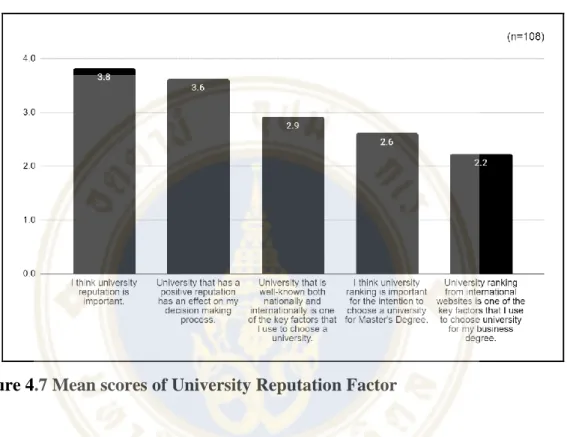
CONCLUSION AND RECOMMENDATION
- Conclusion and Recommendations
- Recommendation
- Limitations
- Future Study
Since the scale in the survey is 1-4, where 1 is strongly disagree and 4 is strongly agree, the factors that get more than 3.1 will be considered influential factors, while those that get an average score below 3.1 will be considered as non-relevant factors influencing the respondents' intention to choose a university for a master's degree. There is a mean score line to indicate that all the factors that are below the mean score line which is 3.1 will be considered not important as shown in the bra chart above. In addition, traveling to and from the university is also something to consider, and as a result of this study, the location of the university seems to be another important factor.
The respondents agreed with the university that it is easy to travel to, and that it is located close to their place of work. The findings of this study show that the influencing factors in the intention to choose a university for a Master's Degree are the university curriculum in which there is a variety of subjects, as well as serving the needs of students and the labor market. Those courses must be something that is needed in the market or will be needed in the future.
For example, as the trends along with the advancement of technology change our world, with those changes there will be a need for new skilled labor in the market. By proving this and if the university can actually do it, it will also increase the reputation of the university. Second, due to time constraints, the respondents who participated in this online survey are those who are already studying for their master's degrees.
Since the aim of this study is to understand and identify the most important factors of students when choosing a university for their master's degree, it might be better for the future study to send the survey to those who have just been accepted from their choice of University. In addition, it is better to send out the survey to those who have the intention of pursuing a master's degree. This study aims to identify the factors that influence graduates when choosing a university for their master's degree.
For this study, it only focuses on respondents who are currently pursuing a master's degree, so it is better for future research to obtain information from respondents who are choosing to pursue a master's degree.
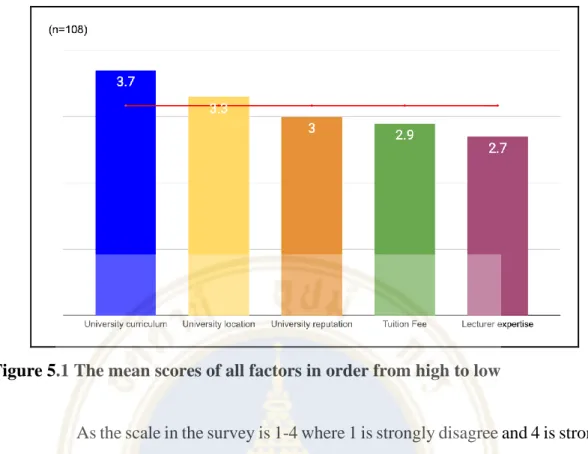
The impact of university-related variables on students' perceived employability and mental well-being: An Italian longitudinal study.
APPENDICES
Appendix A: Survey Questions
Screening Question
Specific Questions
ส ำคัญ
ฉันจะเลือกมหาวิทยาลัยที่ฉันเดินทางไปได้ง่าย ฉันเลือกมหาวิทยาลัยที่ฉันเดินทางไปได้ง่าย)
ห้ำงสรรพสินค้ำ หรือ ใจกลำงเมือง
ค่าเล่าเรียนที่ถูกที่สุดในมหาวิทยาลัยเมื่อเทียบกับมหาวิทยาลัยอื่นๆ มีอิทธิพลมากที่สุดต่อความตั้งใจของฉันในการเลือกมหาวิทยาลัยสำหรับการศึกษาสายอาชีพ) ตัดสินใจเลือกมหาวิทยาลัย หลักสูตรของมหาวิทยาลัยเป็นปัจจัยสำคัญในการเลือกเรียนมหาวิทยาลัยสายอาชีพ).
นิยมในสังคมปัจจุบัน
Demographic Questions
- โปรดระบุเพศของคุณ (Please identify your gender) _ ผู้หญิง (Female)
